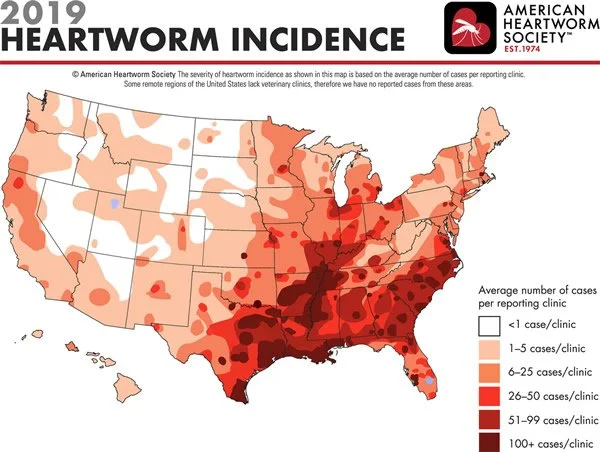Heartworm Disease
THE HEART: An oval-shaped muscle constantly fires with electrical signals to pump oxygenated blood throughout your body and back to your lungs.
ANGEL HAIR PASTA: A long thin noodle about a foot long used to fill the hole in my heart.
While this may be an overdramatization of my love for pasta, it is a reasonably accurate description of heartworm disease in dogs: A plate of angel hair pasta crammed inside a heart.
Heartworm disease is potentially fatal and causes thin, long worms to infect the inside of the heart, pulmonary artery, and lungs. They can block blood flow, causing the heart to work harder to pump blood to the lungs. These worms can cause heart failure and lung problems, which may cause coughing, lethargy, and death.
Heartworm Incidence has increased across the country every year.
Transmission: Heartworm is transmitted by mosquitos. Naturally, every terrible disease has to be shared by mosquitos. “But mosquitos aren’t out in the winter, so I can stop giving preventions, right?” Tell me you have not woken up in the middle of the night in February with one of those jerks flying around your head.
Let’s say you have a friend that doesn't give preventions because "Fluffy doesn't go outside unsupervised, and I would see any mosquitoes on him." (Veterinarians hear this way more than you would think). Now Fluffy has a bunch of worms wiggling around inside his heart and producing heartworm larvae called microfilaria. These baby heartworms travel through Fluffy's blood vessels until that annoying mosquito that buzzes around at 2 am stops by for a snack. The mosquito ingests the larvae, heads to your house, and bites your beloved canine companion. From here, there are two scenarios:
Scenario 1:
You are an informed and responsible owner that has given heartworm preventatives year-round:
The heartworm larvae are killed before they can mature into adult heartworms. The main heartworm preventatives I typically recommend (and am in no way sponsored by any of these companies, yet) are medications that treat heartworms, intestinal parasites, and external parasites such as fleas, ticks, and mange. For the more forgetful (husbands) owners, there is an injection that will prevent only heartworm but will not protect against any other parasites. Your veterinarian can help determine what preventative is best based on your pet's history and any other conditions.
Scenario 2:
I took too long writing this blog post, and because of that, you had no idea about heartworm and haven't given preventions:
Over the next two months after being bitten, the microscopic larvae grow into 6-12 inch long adults, wreaking havoc for the next 5-7 years while creating new microfilaria to share. The worms multiply and spread into the pulmonary artery. Blood flow is restricted, and the heart beats harder and harder to pump blood throughout the body. Because the heart is a muscle, this increased resistance causes the heart's walls to thicken, which leads to long-term damage. Eventually, you may notice coughing, increased respiration rate, tiring quickly, and lethargy. If untreated, the heart may stop altogether.
Treatment: Heartworm prevention will kill the baby heartworm but is ineffective against adults. An injection is given into the muscle multiple times to kill the adults. Now there is a heart full of dying spaghetti noodles that can still travel through the bloodstream. These dying worms can cause an anaphylactic reaction, especially if the heart begins to work too hard. Steroids, antibiotics, and activity restriction are used to help prevent this reaction from occurring. After going through the procedure, we could plan a couple of limb amputations…because it will likely cost an arm and a leg.
As a side note, cats can also get heartworm and should be on monthly prevention. The disease is managed differently because cats are aliens.
The American Heartworm Society is a fantastic resource for more information on heartworm, and where I borrowed information for this post.
I started writing this article several months ago. I married, turned 30, and began doing veterinary relief work again. It has been challenging getting back into blog posts, but I have greatly appreciated all the feedback and help from my family, friends, and coworkers. I couldn't do all of this without all of you!


